Related Research Articles

George Howard, 6th Earl of Carlisle of Castle Howard,, styled Viscount Morpeth until 1825, was a British statesman. He served as Lord Privy Seal between 1827 and 1828 and in 1834 and was a member of Lord Grey's Whig government as Minister without Portfolio between 1830 and 1834.
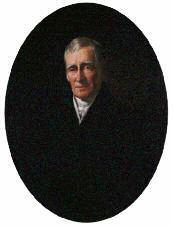
Charles Arbuthnot was a British diplomat and Tory politician. He was Ambassador to the Ottoman Empire between 1804 and 1807 and held a number of political offices. He was a good friend of the Duke of Wellington. His second wife, Harriet, became a hostess at Wellington's society dinners, and wrote an important diary cataloging contemporary political intrigues.
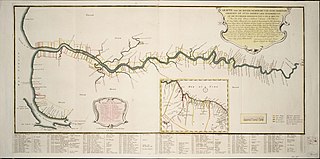
Demerara is a historical region in the Guianas, on the north coast of South America, now part of the country of Guyana. It was a colony of the Dutch West India Company between 1745 and 1792 and a colony of the Dutch state from 1792 until 1815. It was merged with Essequibo in 1812 by the British who took control. It formally became a British colony in 1815 until Demerara-Essequibo was merged with Berbice to form the colony of British Guiana in 1831. In 1838, it became a county of British Guiana until 1958. In 1966, British Guiana gained independence as Guyana and in 1970 it became a republic as the Co-operative Republic of Guyana. It was located around the lower course of the Demerara River, and its main settlement was Georgetown.
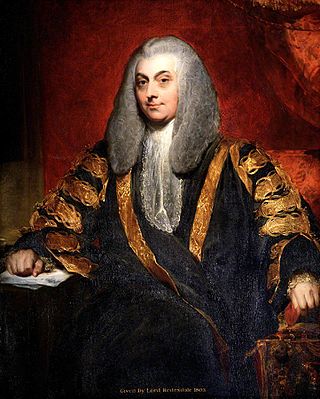
John Freeman-Mitford, 1st Baron Redesdale, PC, KC, FRS, known as Sir John Mitford between 1793 and 1802, was an English lawyer and politician. He was Speaker of the House of Commons between 1801 and 1802 and Lord Chancellor of Ireland between 1802 and 1806.
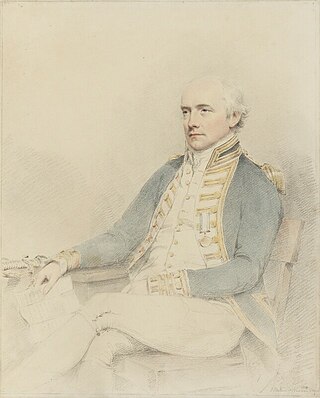
Admiral of the Fleet James Gambier, 1st Baron Gambier, was a Royal Navy officer. After seeing action at the capture of Charleston during the American Revolutionary War, he saw action again, as captain of the third-rate HMS Defence, at the battle of the Glorious First of June in 1794, during the French Revolutionary Wars, gaining the distinction of commanding the first ship to break through the enemy line.
Dysart Burghs was a district of burghs constituency of the House of Commons of Great Britain from 1708 to 1801 and of the House of Commons of the United Kingdom from 1801 to 1832. It elected one Member of Parliament (MP).
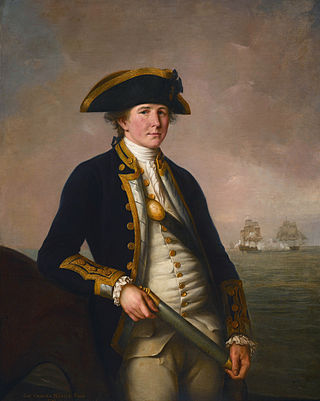
Admiral of the Fleet Sir Charles Morice Pole, 1st Baronet GCB was a Royal Navy officer, colonial administrator and politician. As a junior officer he saw action at the siege of Pondicherry in India during the American Revolutionary War. After taking command of the fifth-rate HMS Success he captured and then destroyed the Spanish frigate Santa Catalina in the Strait of Gibraltar in the action of 16 March 1782 later in that War.
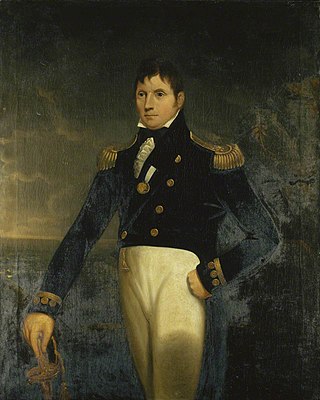
Admiral Sir Eliab Harvey was an eccentric and hot-tempered officer of the Royal Navy during the French Revolutionary and the Napoleonic Wars who was as distinguished for his gambling and dueling as for his military record. Although Harvey was a significant naval figure for over twenty years, his martial reputation was largely based on his experiences at the Battle of Trafalgar, when he took his ship HMS Temeraire into the thick of the action. Harvey used Temeraire to force the surrender of two French ships of the line and later created his family motto from the names of his opponents in the engagement; "Redoutable et Fougueux".
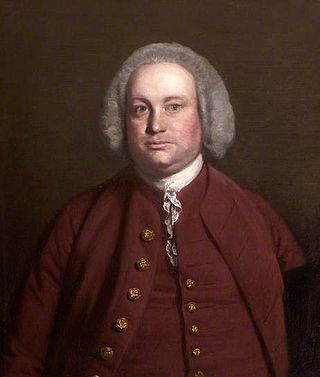
James Buller of Morval in Cornwall and of Downes and King's Nympton in Devon, was a Member of Parliament for East Looe in Cornwall (1741-47) and for the County of Cornwall (1748-1765). He was ancestor of the Viscounts Dilhorne and the Barons Churston and built the Palladian mansion Kings Nympton Park in Devon.
This article about records of members of parliament of the United Kingdom and of England includes a variety of lists of MPs by age, period and other circumstances of service, familiar sets, ethnic or religious minorities, physical attributes, and circumstances of their deaths.

Admiral Sir Joseph Sydney Yorke KCB was an officer of the Royal Navy. As a junior officer he saw action at the Battle of the Saintes in April 1782 during the American Revolutionary War. He commanded HMS Stag at the defeat of the Dutch fleet in August 1795 during the French Revolutionary Wars and went on to be First Naval Lord during the closing stages of the Napoleonic Wars.
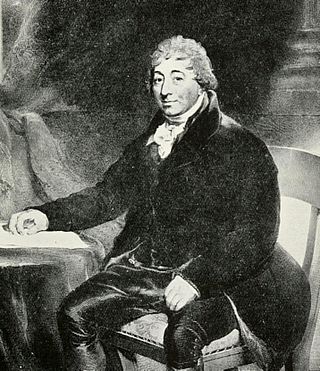
Sir Robert Wigram, 1st Baronet was a British merchant shipbuilder and Tory politician who sat in the House of Commons of Great Britain and of the United Kingdom between 1802 and 1807.
Cromwell Pearce was a colonel in the U.S. army during the War of 1812, served as sheriff of Chester County, Pennsylvania, and later as an associate judge in the county. He lived in West Chester.

Admiral George Stewart, 8th Earl of Galloway,, styled Lord Garlies between 1773 and 1806, was a British naval commander and politician.

Sir Edward Buller, 1st Baronet was an officer of the Royal Navy who served during the American War of Independence and the French Revolutionary and Napoleonic Wars.
Henry Bonham was an English merchant and Member of Parliament.
Lieutenant General Sir John Shaw Stewart Heron-Maxwell, 4th Baronet, known as John Maxwell until 1803, was a Scottish officer in the British Army and a politician.
John Buller (1745–1793), was a British politician who sat in the House of Commons between 1768 and 1784 and was an active agent in various Cornish constituencies..
Allen Daniel Jr. (1772-1836) was a major general in the Georgia Militia during the War of 1812, a member of the Georgia House of Representatives and Georgia State Senate, and the namesake of Danielsville, Georgia, county seat of Madison County. Fort Daniel, built at Hog Mountain in Gwinnett County, Georgia in 1813 was named in his honor.
References
- ↑ "Mr James Buller (Hansard)". api.parliament.uk. Retrieved 23 September 2021.
- 1 2 "BULLER, James II (1772-1830), of Saltash, Cornw". History of Parliament Online. Retrieved 23 September 2021.
- ↑ "West Looe". History of Parliament Online. Retrieved 23 September 2021.